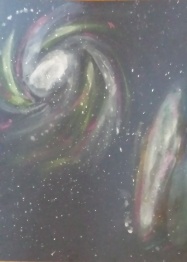It is told that in four billion years our galaxy, the Milky Way, is destined to collide with the Andromeda galaxy. Astronomers can see this happening and has calculated it based on what has been seen. Yet astronomers might have an easier time observing this astronomical event if light pollution wasn’t as big of a problem.
Light pollution is a constant threat to not only the environment, but also astronomers and their work. With the amount of light pollution cities are emitting it makes it harder to observe stars and galaxies as night. That’s why Globe at Night conducts projects that people can volunteer to participate in that raises awareness of light pollution.
When picking a citizen science project for my environmental science class at Washtenaw Community College, I wanted to do something in astronomy. That’s when I came upon Globe at Night and the project they are conducting for the month of June. For the project I go outside every night at home to take a picture of the night sky through an app that will transfer to Globe at Night’s data center. Although, every night I would go out it would be cloudy and you couldn’t see any stars. Until June 14th; the sky was clear, the night was warm, and stars came out of hiding. I had been waiting forever to see the stars and I wasn’t disappointed when they finally showed. While looking at the stars I realized that if there wasn’t as much light pollution I could see even more. That is when a question formed; if there wasn’t light pollution, could we actually see the galaxy Andromeda coming towards us?
So far with light pollution astronomers have been able to tell that galaxy Andromeda is about 2.5 light years away and is heading towards us at 402,000 kilometers per hour. Astronomers can see the galaxy coming towards us, but citizens not looking through a telescope can’t see anything. Since a lot of people live in a city or near a city there view of the the stars are being skewed because of the light pollution, so if you are trying to look at the Andromeda galaxy coming towards us you probably couldn’t until it comes really close. Alan MacRobert, an amateur astronomer who has written many blog posts on astronomy, said “Nebulae and galaxies, with their low surface brightnesses, are hit hardest by light pollution” which confirms my hypothesis that you probably couldn’t see the galaxy, and it is all because of light pollution.
Astronomers and citizens without a telescope should be able to see this amazing event. If you actually, at some time, want to see the astronomical event and make a difference in the world then there are a couple of things you can do. One, you can use lower wattage light bulbs; two you can switch out lights that are turned on all night long to motion sensored lights. Three, buy fixtures that fully in encase the light bulb so the lightened area is just below the light. The greatest thing you could do, though, is spread the word about light pollution and the problems it has caused. Just these little things can have a big impact, and not only would you be making a difference you also get a beautiful benefit out of it at night.
Sources I used:
Drake, Nadia. “Milky Way Has 4 Billion Years to Live — But Our Sun Will Survive.” Phenomena Milky Way Has 4 Billion Years to Live But Our Sun Will Survive Comments. National Geographic, 24 Mar. 2014. Web. 23 June 2014.
http://phenomena.nationalgeographic.com/2014/03/24/scientists-predict-our-galaxys-death/
MacRobert, Alan. “Observing from the City.” City Observing. Astronomy Education, n.d. Web. 26 June 2014.
http://www.astronomy-education.com/index.php?page=191
Kornreich, Dave. “How Does Light Pollution Affect Astronomers?” Curious About Astronomy:. Cornell.edu, Apr. 1999. Web. 26 June 2014.
http://curious.astro.cornell.edu/question.php?number=194
Toothman, Jessika. “How Light Pollution Works.” HowStuffWorks. HowStuffWorks.com, 31 Aug. 2009. Web. 26 June 2014.
http://science.howstuffworks.com/environmental/green-science/light-pollution3.htm
“Globe at Night.” Globe at Night. N.p., n.d. Web. 26 June 2014


